From your 30s to your 60s - the best foods to eat for every decade
Whether you're in your 30s or 60s, what you eat can make a huge difference to your health.
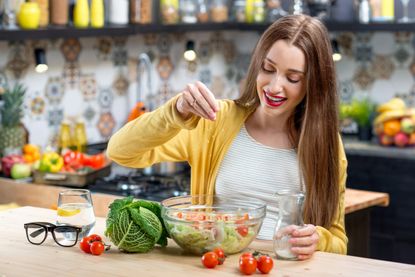
Whether you’re in your 30s or your 60s, what you eat can make a huge difference to your health.
Whatever your age, diet has a huge in influence on everything from energy levels to vitamin deficiencies. And, as we go through the decades from our 30s to 60s, our bodies demand different things. But whereto start?
Here’s the definitive guide to what to eat – and how you might cook or prepare it for maximum taste and enjoyment for each decade.
The best foods to eat in your 30s
In our late 20s and 30s, we may be considering or going through early motherhood, while the stresses of work life are mounting. Trying to conceive requires folic acid, which you could get through a supplement, but there are also fortified foods that can supply it.
High calcium
Nutritionist Rebecca Stevens says, ‘If you’re breastfeeding, you need more energy; about 500 extra calories a day. A little bit of cake is OK as long as there’s balance in the diet. You also need to be thinking about your calcium levels. Calcium-rich foods are usually dairy, but if you drink a plant-based milk then make sure it’s calcium-enriched or fortified.’
Omega 3
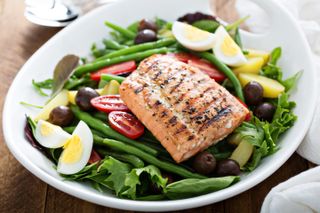
You also need omega-3, which has been shown in studies to transfer into the breastmilk to support the baby’s brain growth. ‘Try to eat one or two servings of oily fish recipes like salmon, sardines, mackerel or trout per week (not every day!),’ Rebecca adds. Try smoked salmon for breakfast, or rustle up a smoked mackerel pate (add creme fraiche and seasoning to mackerel in a blender and whizz into a paste).
Vitamin B
Nutritional therapist Jackie Lynch believes it’s all about B vitamins in your 30s. ‘This is, for a lot of us, the decade when your career is starting to take off. If you have children as well, you’re probably juggling too much,’ she says. ‘The B vitamins are the links in the chain reaction of energy production. There are also certain B vitamins that play a part in mental health.’B3, B6 and B12 are the ones to focus on, she adds, warning that ‘alcohol depletes B vitamins’.
GoodtoKnow Newsletter
Parenting advice, hot topics, best buys and family finance tips delivered straight to your inbox.
‘Most B vitamins, apart from B12, are found in veg, so aim for five vegetables a day; not a mix of fruit and veg. Ideally, aim for five veg and then two fruit on top of that.’ B12 is only found in animal sources, so if you’re vegan, you may need to take a B12 supplement.’
The best foods to eat in your 40s
I think women in their 40s often feel like they’re running on empty,’ says Jackie.
Magnesium
‘Magnesium is key because if minerals were people, magnesium would be a very busy woman – as well as being fundamental to energy (it’s like our ignition key), it also looks after muscle function. If you get a twitchy eyelid, that’s often due to magnesium deficiency.’
Sources include leafy green vegetables like rocket, kale and spinach as well as brown rice. Swap white rice for brown rice with your stir-fry.
Protein
Muscle mass can deplete as we go into our 40s, and the way to combat that is via protein.
‘It’s a change in habit; just try adding a little bit more into your diet,’ Rebecca says. ‘If you’re not keen on meat then you could try tofu, soya, beans, pulses, and all types of lentils. Quorn is a good option, too.’
Think about adding protein into your breakfast routine with an omelette. ‘Eggs can help you feel fuller for longer and stop you reaching for the mid-morning snacks,’ adds Rebecca.
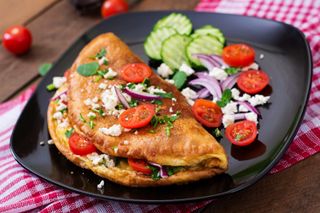
Isoflavones
As peri-menopause begins later in our 40s, we can experience vaginal dryness. ‘Compounds called isoflavones can help,’ says Rebecca. ‘You need to eat isoflavones each day though, rather than having a lot on, say, Wednesday, then nothing on a Thursday.
This could be achieved by having foods containing isoflavones through the day; for example, soya milk or yogurts, linseeds in bread or added to a smoothie, edamame beans, chickpeas or tofu.’
The best foods to eat in your 50s
Calcium
'The average age fora woman to reach menopause in the UK is 51, a time when the risk of osteoporosis increases as bone density is lost,’ says dietician Sian Porter. ‘It’s important to ensure adequate calcium intake.’ That’s 700mg a day for adults – 200ml of milk is around 240mg of calcium. ‘This can come from dairy or fortified alternatives, fish with soft edible bones like tinned salmon or sardines, tofu, sesame seeds, broccoli, spinach and dried figs,’ says Sian.
Omega-3
A tofu stir-fry is ideal, and you could add in walnuts, she says. ‘They’re the only tree nut to contain a significant amount of the plant-based omega-3.’ Jackie adds that hormone balance is key. ‘Add a spoonful of ground flaxseed to your porridge; it’s full of plant compounds called phytoestrogens that help to balance hormones. Some studies showit helps to reduce hot flushes as well.’
The best foods to eat in your 60s
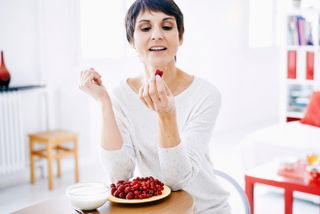
Protein
Protein is key now, says Jackie, as our muscle mass continues to deteriorate in this decade. ‘Have protein with every meal and snack, and remember that’s not just meat and fish; it’s nuts and seeds, quinoa, pulses and eggs.
For lunch, don’t just have leafy greens, dollop some houmous or a can of tuna on the leaves. If you have a piece of fruit, have seven almonds with it.’
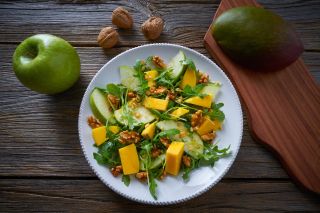
Looking after your eye health is also important, advises Sian. ‘Leafy green vegetables such as spinach, kale, broccoli, and brightly coloured fruit and vegetables such as peppers, carrots, tomatoes, and mangos contain plant components that help to look after your vision and slow down deterioration,’ she explains. Try baking a tray of vegetables with olive oil and herbs, along with a piece of salmon for another dose of omega-3.
-
 Compromising may be killing your relationship - here are 5 ways to reach healthy compromises, according to relationship expert
Compromising may be killing your relationship - here are 5 ways to reach healthy compromises, according to relationship expertCompromising isn't always the best way to keep the peace in a relationship
By Charlie Elizabeth Culverhouse Published
-
 Best interactive pets for kids: 15 gift ideas for children of all ages
Best interactive pets for kids: 15 gift ideas for children of all agesFrom puppies to axolotls, take a look at our selection of the best interactive pets you can buy that are sure to be a hit with little animal lovers
By Sarah Handley Published